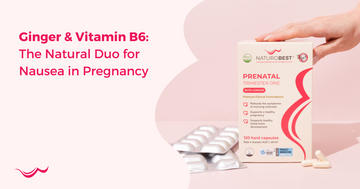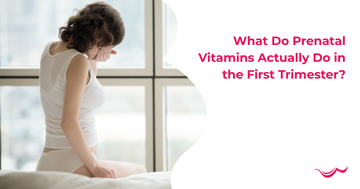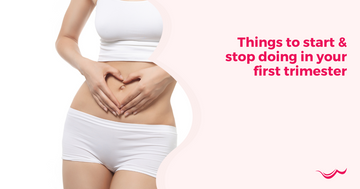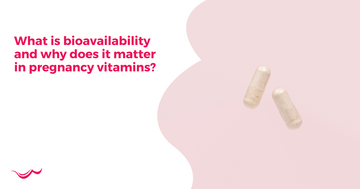When to start taking prenatal vitamins
by NaturoBest Naturopath Team on Aug 08, 2023

During the first trimester, from conception to around 12 weeks, your body begins adapting rapidly to support your growing baby. Hormonal changes can make you feel moody, tired, or irritable, which is completely normal.
As your body nourishes and protects your developing baby, it’s important to ensure you’re getting the right nutrients. While eating a balanced, nutrient-dense diet is ideal, taking a prenatal vitamin provides essential support for your baby’s growth and development.
If your pregnancy was unplanned, start taking a prenatal supplement as soon as you find out you’re pregnant. However, the optimal time to begin is at least four months prior to conception to prepare your body for pregnancy.
Key Nutrients in the First Trimester
Folate
Folate is the naturally occurring form of vitamin B9. It plays a vital role in reducing the risk of birth defects in the baby’s brain and spine, such as spina bifida and anencephaly, by 50% or more.
It may also lower the risk of miscarriage, particularly in women with elevated homocysteine levels, an amino acid that, when high may affect blood flow and clotting.
Vitamin B12
Vitamin B12 and folate work together in DNA synthesis, essential for healthy cell growth and replication. Research suggests that vitamin B12 supplementation during pregnancy and shortly after birth may enhance cognitive development in children. Conversely, B12 deficiency early in pregnancy may increase the risk of neural tube defects.
Choline
Choline is crucial for foetal brain development, memory formation, and nervous system function. Deficiency during pregnancy may impair lifelong memory function in the child. Studies suggest that around 440 mg of choline daily can help protect against neural tube defects.
Iodine
During the first trimester, your baby’s thyroid becomes active and depends entirely on maternal thyroid hormones for healthy brain development. The recommended daily intake (RDI) of iodine in pregnancy is 220 mcg, achieved through diet and supplementation. Therefore, at least 150 mcg daily from a supplement is recommended to meet this need.
Iron
Iron is an essential mineral but can worsen morning sickness symptoms in early pregnancy. Ideally, iron stores are replenished before conception through a preconception care plan, reducing the need for iron in the first trimester.
The Second Trimester: Increased Nutrient Demand
Iron
Iron supports the production of extra blood for both you and your baby. From around week 16, blood plasma volume doubles, leading to a natural haemodilution (anaemia of pregnancy). This is why many women experience mild anaemia during the second and third trimesters.
Severe anaemia, however, increases the risk of preterm birth, low birth weight, and infant iron deficiency. It can also contribute to blood loss during labour and lower maternal immunity.
Pregnant women require 27 mg of iron daily, compared to 18 mg for non-pregnant women. Supplementation typically starts in the second trimester at around 24 mg/day, but your healthcare provider will confirm this based on blood test results.
DHA (Omega-3 Fatty Acids)
Omega-3 fatty acids, especially DHA, are critical for the development of your baby’s eyes, brain, and nervous system. Studies also suggest DHA may help improve maternal mood during late pregnancy and postpartum.
Rich food sources include anchovies, sardines, and eggs.
Calcium
Calcium supports the formation of your baby’s bones, teeth, and skeletal structure. Pregnant women need approximately 1,000 mg per day, which can be achieved through foods like milk, dairy products, salmon, and sesame seeds.
When supplementing, ensure your calcium supplement includes cofactors such as magnesium, vitamin D3, and vitamin K2. Vitamin K2 directs calcium to the bones and teeth, preventing build-up in the arteries.
Magnesium
Magnesium is involved in more than 300 enzyme reactions in the body. A daily intake of around 350 mg supports muscle and nerve function, healthy blood pressure, and strong bone development for both mother and baby.
Vitamin D
Vitamin D helps the body absorb calcium efficiently and supports bone strength. The RDI during pregnancy is 200 IU daily, though many women benefit from more, depending on sunlight exposure and blood levels. A few minutes of midday sun on your chest or arms can help maintain healthy vitamin D levels.
Vitamin K2
Vitamin K2 ensures calcium is deposited in bones and cartilage rather than soft tissues like blood vessels. It’s especially important during pregnancy for foetal skeletal and facial development, including dental arches and jaw structure.
Vitamin C
Vitamin C plays a key role in tissue repair, wound healing, and collagen formation, all important for skin elasticity and recovery postpartum. The RDI in pregnancy is 60 mg and during breastfeeding it is 85 mg daily. It also enhances iron absorption and supports immune health.
Can Prenatal Vitamins Cause Black Stool?
Dark or black stools can sometimes occur when taking low-quality iron supplements that aren’t well absorbed. It may also result from dehydration, constipation, or dietary factors.
To prevent this, choose a high-quality iron supplement designed for optimal absorption or focus on iron-rich foods such as red meat, legumes, and leafy greens.
Nutrients Needed in the Third Trimester
The third trimester is an exciting time as you prepare to meet your baby, but it’s also when nutrient demands are highest.
- Iron: Blood volume peaks, and more than 90% of anaemia cases develop in this trimester.
- Protein: Needed for foetal growth, cellular development, and a healthy placenta.
- Omega-3 (especially EPA): Supports final stages of brain development and may reduce the risk of postpartum depression.
- Healthy fats: Aid in foetal brain protection and help build maternal nutrient stores for breastfeeding.
At this stage, your caloric needs increase. Aim for an additional 340 calories per day in the second trimester, and slightly more in the third.
Taking Prenatal Vitamins While Breastfeeding
Continue taking prenatal vitamins while breastfeeding. Breastfeeding increases the need for specific nutrients to support maternal recovery and milk production.
Key nutrients include:
- Iodine (270 mcg daily) - essential for infant brain development and thyroid health.
- Choline (550 mg daily) - supports brain growth and memory function during the first year of life.
Maintaining supplementation ensures both you and your baby remain nourished through this important stage.
Final thoughts
Prenatal vitamins are an essential part of supporting a healthy pregnancy, from conception through to breastfeeding.
Start as early as possible, choose quality formulations that evolve with each trimester, and speak with your healthcare professional about the right combination for your needs.




